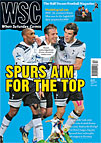 A fine League Cup run may be a welcome diversion from a relegation battle for the Hammers, but historical precedent worries Mark Segal
A fine League Cup run may be a welcome diversion from a relegation battle for the Hammers, but historical precedent worries Mark Segal
In a season which so far has bought nothing but pain, disappointment and misery, the Carling Cup is providing some light relief for West Ham fans. While Avram Grant’s limited team plod along unconvincingly in the Premier League, the season’s first cup competition has seen them score wins over Sunderland, Stoke and, most impressively, Manchester United in the quarter-finals.
That 4-0 victory at a freezing Upton Park in late November secured the club’s first League Cup semi-final appearance in over 20 years and puts them two games away from a first Wembley final in almost 30 years. But while the thought of facing Birmingham over two legs has not led to too many sleepless nights for those dreaming of the national stadium, for many with a sense of history West Ham’s reappearance at this stage of the competition brings back some rotten memories of two of the club’s most disappointing results in recent times. And there are parallels with this season which could have Grant shifting uneasily in his dugout.
The 1988-89 First Division campaign had started poorly at Upton Park with an opening day thumping at Southampton setting the tone for a miserable early part of the season. But while the Hammers were shipping goals in the league, they could not stop scoring them in the League Cup. First up Derby were dispatched 5-0 in the third round and then champions Liverpool left east London on the back of a 4-1 thrashing.
This game saw Paul Ince come to national prominence after he belted in a volley direct from a corner, while Tony Gale finished off the evening with a sweetly struck free-kick to inflict Liverpool’s worst domestic cup defeat in almost 50 years. A quarter-final win over Aston Villa after Christmas set up a last-four meeting with Luton Town. Despite the Hatters being the cup holders, like West Ham they too were struggling at the wrong end of the table and Hammers fans were confident. How wrong they were.
On a bright Sunday afternoon in front of the ITV cameras, West Ham put in one of their poorest performances in a season full of poor performances. Northern Ireland international goalkeeper Allen McKnight, who was having an awful debut season at the club, was beaten three times and was singled out for blame by the fans behind his goal on the old North Bank.
At one point a frustrated fan ran on the pitch to remonstrate with McKnight and it was telling that not one team-mate came to his aid. The Hammers chased a lost cause in the second leg and ended up losing 5-0 on aggregate. A miserable season ended with the club relegated and manager John Lyall sacked after 15 years in charge.
New manager Lou Macari took over in the summer and a bright opening to the season quickly led to thoughts of promotion. But the playing style adopted by the former Manchester United forward won him few friends in the East End and meant when results failed to materialise the pressure increased.
An FA Cup third round defeat to lowly Torquay and legal rumblings following his time as manager of Swindon meant Macari was under pressure going into the New Year, but again the League Cup provided some relief. After two draws, West Ham faced Derby in a second replay at the quarter-final stage and just about scraped through in one of the most bruising encounters I’ve ever witnessed. But once again the semi-finals proved a massive let-down.
Facing promotion rivals Oldham, the Hammers travelled to Boundary Park on Valentine’s Day 1990 in good heart but all that followed on the Latics’ notorious plastic pitch was another League Cup capitulation – and a dream for football headline writers across the country. Not content with matching the three Luton had put past the Hammers the season before, Oldham went for the jugular and ended up scoring six without reply. Four days later Macari was sacked.
Club legend Billy Bonds was swiftly appointed as the club’s new manager and a fired-up West Ham side at least restored some pride with a 3-0 second-leg victory. However, Bonds couldn’t put together a run needed in the league and the Hammers stayed in the second tier. Fast forward 20 years and the League Cup is once again diverting attention away from league form.
But if history is anything to go by, West Ham supporters shouldn’t be checking their availability on final day just yet and Grant may soon find out that the competition is not quite the comfort blanket he thought it was.
From WSC 288 February 2011